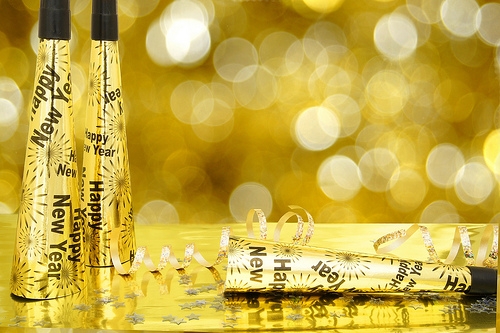December 31st, 2013

Watching the clock tick down the final seconds until midnight, many of us- Princeton Restorative & Implant Dentistry included- feel nostalgic about the passing year and hopeful about the new one to come. New Year’s Eve is one of the most widely celebrated holidays in the world, with over-the-top celebrations taking place in dozens of countries. The Gregorian calendar, which is widely used in Western nations and around the world, was implemented in 1582. Since that time, December 31st has marked the final day of the year, with midnight heralding the beginning of a brand new year. In the United States, New Year’s Day is a public holiday; government offices, schools, public organizations, and many businesses are closed for the day. Ponder the following fun facts as you think about your plans for the holiday:
- Approximately one billion people watch the New Year’s Eve ball drop in Times Square, New York City. This televised event is one of the most iconic New Year’s celebrations in the world. For many years, watching the ball drop meant tuning in to Dick Clark’s Rockin’ New Year’s Eve, an iconic television special dear to the hearts of many viewers.
- The idea for the New Year’s Eve ball came about because of a citywide ban on fireworks. Before 1907, when fireworks became illegal in New York City, celebrations included an elaborate fireworks show. The large, glittering, illuminated ball was developed as an alternative. Although the first ball was heavy at 700 pounds, the modern New Year’s Eve ball is made of Waterford crystal and tips the scale at six tons!
- The top five New Year’s resolutions are: to lose weight, quit smoking, get a new job, return to school, or increase personal savings. However, approximately 88% of New Year’s resolutions fail. But don’t let that discourage you! Resolutions are most likely to succeed when they are clear, achievable goals. Setting out a concrete plan to achieve your resolution also boosts your chances of success.
- Eating black-eyed peas on New Year’s Day is said to bring good fortune in the new year. Collard greens, cabbage, and ham hocks are also considered lucky foods to enjoy. Just steer clear of the chicken or turkey dinners; eating poultry is a bad omen for the year to come.
Whether you plan to stay in Princeton, NJ, or head out into the crowds to watch the ball drop in Times Square, New Year’s Eve is a time to enjoy friends and family. Send your loved ones well wishes for the New Year, and look for that special someone to share a midnight kiss with for good luck!
December 24th, 2013

As you age, it becomes even more important to take good care of your teeth and dental health. According to the Centers for Disease Control and Prevention, approximately one-fourth of adults age 65 and older have no remaining teeth. What's more, nearly one-third of older adults have untreated tooth decay.
Oral health, regardless of age, is crucial to overall good health. Ideally, we all want to keep your natural teeth, but whether you're caring for natural teeth or dentures, advancing age may put older adults at risk for a number of oral health problems, including:
- Dry mouth
- Diminished sense of taste
- Root decay
- Gum disease
- Uneven jawbone caused by tooth loss
- Denture-induced tissue inflammation
- Overgrowth of fungus in the mouth
- Attrition (loss of teeth structure by mechanical forces)
- Oral cancer
These conditions may not be diagnosed until it is too late. If you want to feel good, stay healthy, and look great throughout life, you might be surprised what a difference a healthy mouth makes.
Here are some tips for maintaining and improving your oral health as you become older:
- Brush twice a day with a toothbrush with soft bristles. You may also benefit from using an electric toothbrush.
- Clean between your teeth once a day with floss or another interdental cleaner.
- If you wear full or partial dentures, remember to clean them on a daily basis. Take your dentures out of your mouth for at least four hours every day. It’s best to remove them at night.
- Drink tap water. Since most contains fluoride, it helps prevent tooth decay no matter how old you are.
- Quit smoking. Besides putting you at greater risk for lung and other cancers, smoking increases problems with gum disease, tooth decay, and tooth loss.
- Visit Princeton Restorative & Implant Dentistry regularly for a complete dental checkup.
If you have any questions about keeping up with your oral hygiene at home, please give us a call!
December 17th, 2013

It's a moment many of our patients have experienced. One second you're chewing on a piece of gum, then suddenly you forget to keep chewing and swallow the entire rubbery gob whole! It's at this point you remember your mother warning you as a child that if you swallow gum it will stake a claim and take up residency in your belly for seven years. Dr. Stephen Hudis and our team at Princeton Restorative & Implant Dentistry hate to take all the fun out of the mystery, but the truth is that chewing gum, when swallowed, will enter your stomach and move through your digestive system just like any other piece of food. So, if you ever accidentally swallow a piece of gum, there is no need to worry!
That being said, it's important to know that gum does not have any dietary benefits, so while it’s not exactly harmful to swallow, you still want to avoid swallowing it. If you are an avid gum-chewer, we encourage you to chew sugarless gum, especially if you are wearing braces, because gum with sugar can lead to cavities. Sugarless gum still has the same amount of flavor, but has fewer cavity-causing ingredients. In fact, many brands contain an additive called xylitol, a natural sweetener known to fight cavity-causing bacteria. Xylitol is also known to increase salivary flow as it rinses away plaque and acid.
The fact is, when the bacterium in your mouth breaks down sugar, what’s left behind is acid. This acid eats away at the enamel coating of your teeth, causing holes that we call cavities. Cavities can lead to other long-term mouth problems if they are not treated in time, so it is best to try and avoid overexposing your teeth to too many harmful substances!
If you have any questions about chewing gum, please contact our office. Happy (sugar-free) gum chewing!
December 10th, 2013

At Princeton Restorative & Implant Dentistry, we know most of our patients enjoy a cup of coffee or two throughout the day. But what many of you don’t know is that coffee can be especially tough on your teeth because tannic acid (the substance that makes the dark color) etches into the pits and grooves of tooth enamel, staining your pearly whites and being generally detrimental to your smile.
Coffee is one of the most popular beverages in the world, with more than 50 percent of people drinking a cup daily. Other foods and drinks such as wine, chocolate-flavored beverages, and soft drinks can all cause tooth enamel discolorations. A hot cup of Joe, however, goes one step farther: extreme temperature changes in your mouth can cause teeth to expand and contract. This allows stains to penetrate deep into the micro-cracks of your tooth enamel.
Additionally, caffeine is considered a diuretic, which means it causes the body to lose fluids. So when you enjoy coffee or any kind of caffeinated beverage, it slows the production of saliva and causes dry mouth, which can potentially lead to bad breath and even tooth decay.
If you just can't make it through the day without a cup of java, we encourage you to consider these tips to help make sure your teeth stay in tip-top shape:
- Drink a glass of water with your coffee or rinse with a glass of water after every cup. Not only does it help neutralize and rinse away the acid left behind from the coffee, but it also helps replenish fluids drawn out of your body by caffeine.
- Chew gum after you drink coffee. Chewing gum will help keep your saliva production up and prevent dry mouth.
- Enjoy your beverage with a straw so that tannins don’t make contact with your front upper and lower teeth.
- Switch to decaf. Each cup of regular coffee you drink has an average of 110 milligrams of caffeine. Decaf has the same great taste with only two to 12 milligrams of caffeine.
Dr. Stephen Hudis and our team also invite you to visit our convenient Princeton, NJ office for whitening options. We can help bleach your teeth with proven and professional products. To learn more about whitening options available at Princeton Restorative & Implant Dentistry, please give us a call!








